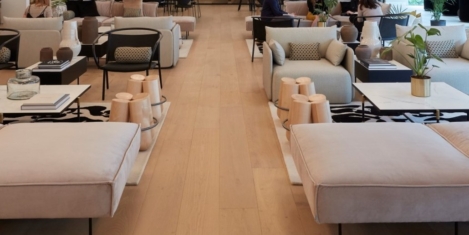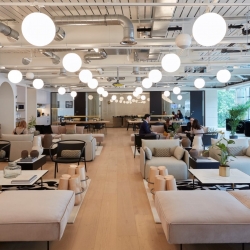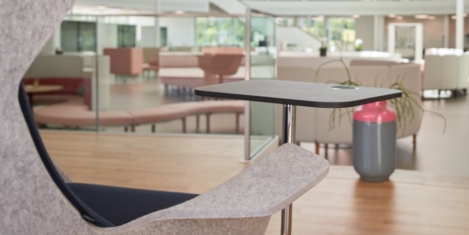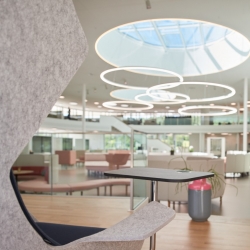To provide the best experiences, we use technologies like cookies to store and/or access device information. Consenting to these technologies will allow us to process data such as browsing behaviour or unique IDs on this site. Not consenting or withdrawing consent, may adversely affect certain features and functions.
The technical storage or access is strictly necessary for the legitimate purpose of enabling the use of a specific service explicitly requested by the subscriber or user, or for the sole purpose of carrying out the transmission of a communication over an electronic communications network.
The technical storage or access is necessary for the legitimate purpose of storing preferences that are not requested by the subscriber or user.
The technical storage or access that is used exclusively for statistical purposes.
The technical storage or access that is used exclusively for anonymous statistical purposes. Without a subpoena, voluntary compliance on the part of your Internet Service Provider, or additional records from a third party, information stored or retrieved for this purpose alone cannot usually be used to identify you.
The technical storage or access is required to create user profiles to send advertising, or to track the user on a website or across several websites for similar marketing purposes.
 There’s a scene in the 1986 horror movie The Fly in which Seth Brundle (Jeff Goldblum) persuades the reporter Veronica Quaife (Geena Davis) to try two steaks, one of which Brundle has just sent between two teleportation pods in an effort to work out why they can’t process organic matter, including the organic matter belonging to a very unfortunate baboon. (more…)
There’s a scene in the 1986 horror movie The Fly in which Seth Brundle (Jeff Goldblum) persuades the reporter Veronica Quaife (Geena Davis) to try two steaks, one of which Brundle has just sent between two teleportation pods in an effort to work out why they can’t process organic matter, including the organic matter belonging to a very unfortunate baboon. (more…)








 One of the more welcome outcomes from the pandemic has been a reinvigorated and better conversation about the environment in general and workplace sustainability in particular.
One of the more welcome outcomes from the pandemic has been a reinvigorated and better conversation about the environment in general and workplace sustainability in particular. 
 Restrictions may have been lifted but there is no major rush for everyone to head back to the office. Many
Restrictions may have been lifted but there is no major rush for everyone to head back to the office. Many 
 I recently read an interesting little book called
I recently read an interesting little book called 
 Most people now recognise that we are facing a climate emergency – the record breaking temperatures in the US are, perhaps, another reminder. Many would agree that economic and legislative change is the only way forward to achieve a sustainable change in behaviour. Who should pay for greater environmental responsibility? Is it time for a carbon tax to limit carbon hungry products and fund investment?
Most people now recognise that we are facing a climate emergency – the record breaking temperatures in the US are, perhaps, another reminder. Many would agree that economic and legislative change is the only way forward to achieve a sustainable change in behaviour. Who should pay for greater environmental responsibility? Is it time for a carbon tax to limit carbon hungry products and fund investment? 
 Perhaps the most famous single act of personal creativity – with apologies to Archimedes – is Mary Godwin’s moment of inspiration for the story of Frankenstein in 1816. It was born from a wet summer in a villa on the shores of Lake Geneva, largely spent with her future husband Percy Shelley, John Polidori and Lord Byron. The poor weather and isolation meant the party had to entertain themselves the best they could.
Perhaps the most famous single act of personal creativity – with apologies to Archimedes – is Mary Godwin’s moment of inspiration for the story of Frankenstein in 1816. It was born from a wet summer in a villa on the shores of Lake Geneva, largely spent with her future husband Percy Shelley, John Polidori and Lord Byron. The poor weather and isolation meant the party had to entertain themselves the best they could. 
 As businesses return to their offices they are faced with a challenge – how do they reappraise their space requirements post-Covid? Social and technological advancements are changing real estate from being a fixed physical product, into flexible, employee-centric spaces that enable new models of hybrid working and business operations. These have a significant impact on the ways that businesses work and the options available to them.
As businesses return to their offices they are faced with a challenge – how do they reappraise their space requirements post-Covid? Social and technological advancements are changing real estate from being a fixed physical product, into flexible, employee-centric spaces that enable new models of hybrid working and business operations. These have a significant impact on the ways that businesses work and the options available to them. 


 One of the unintended consequences of the pandemic has been to focus attention on the issue of indoor air quality. But as Sarah Zhang points out
One of the unintended consequences of the pandemic has been to focus attention on the issue of indoor air quality. But as Sarah Zhang points out 
 The word ‘languishing’ is being bandied around in the media as the world tries to recover from the pandemic and is experiencing many struggles resuming a semblance of ‘normal life’. Recent articles in
The word ‘languishing’ is being bandied around in the media as the world tries to recover from the pandemic and is experiencing many struggles resuming a semblance of ‘normal life’. Recent articles in 










August 18, 2021
Workplace technology helped meet short term lockdown challenges, but its real impact is yet to come
by Simon Haighton-Williams • Comment, Technology